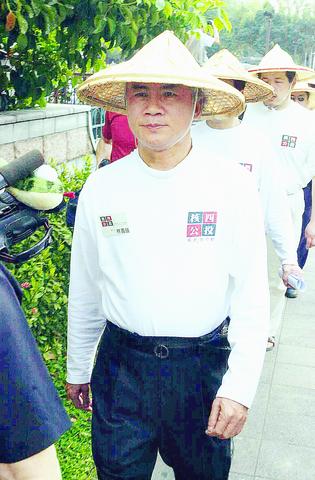Practicing the philosophy of Mahatma Gandhi, former DPP chairman Lin I-hsiung (
A week ago, Lin led members of the Association for Promoting Public Voting on the Fourth Nuclear Power Plant (核四公投促進會) for a sit-down demonstration in front of the Executive Yuan to demand that the government determine the future of the controversial plant through a plebiscite.

PHOTO: SEAN CHAO, TAIPEI TIMES
Lin remained silent throughout the half-day activities as he joined the group on an hourly walk around the building, and he meditated when he was sitting down. He took no heed of any politicians that came to show their concern or sought to communicate with them.
The more Lin remains quiet, the more pressure the DPP feels because it was him who led the party to power, but now the former party chairman appears to be a major critical force as the party prepares for the presidential election next year.
Lin has been advocating non-violent resistance since the early 1990s. In 1994, he put the idea into practice by leading the first wave of nationwide anti-nuclear protests in September that year, which was preceded with a hunger strike.
The drive is on its third round. Since Sept. 21 last year, Lin has led activists on a 1,000km march across the country to rally support for a national referendum on the future of the Fourth Nuclear Power Plant. He and his followers plan to march 20km every weekend for at least 50 weeks.
By launching the hunger strike and marching drive, Lin said he meant to "highlight the resolve of anti-nuclear activists and at the same time train the bodies and souls of the movement's campaigners."
An anti-nuclear stance is part of the DPP's party charter. Among the numerous anti-nuclear politicians, Lin wins the most respect because he is not trying to solicit votes. He regards opposing nuclear power as a political conviction and it is his life-long goal to abolish nuclear power in Taiwan, a goal which he tries to attain through physical suffering, like what is endured by an ascetic monk.
The DPP has paid a huge price on the anti-nuclear issue. In October 2000, the party made the announcement to scrap the project, in part due to Lin's insistence. But the decision quickly turned into a debacle for the DPP, which had only been in power for a few months and had a minority in the legislature. It was compelled to reverse its decision and give in to the opposition parties the following January. The same dilemma is coming back to vex the party two years later.
Lin is persistent, uncompromising and full of a sense of justice. But these qualities intensified after Lin's 6-year-old twin daughters were brutally murdered along with their grandmother on Feb. 28, 1980.
Lin's eldest daughter, Huan-chun (
The murder took place at midday in their home when Lin, then a provincial assemblyman, was arrested for participating in a human-rights rally in Kaohsiung on Dec. 10 the previous year, whereas his wife Fang Su-min (
The murderer has never been apprehended. However, Lin and many Taiwanese believe that the killings were politically motivated.
The girls and their grandmother were not buried until Lin was released from jail in 1984. Fang and the surviving daughter moved to the US to start a new life soon after the mishap. In 1985, Lin joined his family in California, setting out on a four-year voyage of learning in the US, Europe and Japan.
The time abroad was an opportunity for him to heal his sorrow and to hone his talents to serve Taiwan in the future.
But he also developed different interests, for the family tragedy had provoked him to pursue eternal values as he grew disenchanted with the transience of politics.
Since he returned to Taiwan in 1989, Lin has devoted himself to social and political reforms.
In March 1991, he founded the Chilin Foundation (慈林文教基金會), seeking to end political corruption through spiritual reform. The foundation focuses on cultivating young talents and disseminating Lin's beliefs in mercy and love.
At the time when the DPP's resolution on reform has sometimes given way to political considerations, Lin represents a moral force in the party that can not be challenged.
Lin treats issues such as the anti-nuclear movement or the need for a public referendum like a social-awakening movement. They are tools for him to carry out his conception of true democracy, which is, "the people are the master in a civil society; the strength of the people outweighs that of the government."
It will be a long way to go before he reaches his goals under Taiwan's fledgling democracy.
As he cited Robert Frost's poem The Road Not Taken the day he resigned his DPP chairmanship in May 2000, Lin said that he would always choose "the road less traveled by, and that has made all the difference."
The difference Lin insists, however, will put the DPP in a quandary.

Trips for more than 100,000 international and domestic air travelers could be disrupted as China launches a military exercise around Taiwan today, Taiwan’s Civil Aviation Administration (CAA) said yesterday. The exercise could affect nearly 900 flights scheduled to enter the Taipei Flight Information Region (FIR) during the exercise window, it added. A notice issued by the Chinese Civil Aviation Administration showed there would be seven temporary zones around the Taiwan Strait which would be used for live-fire exercises, lasting from 8am to 6pm today. All aircraft are prohibited from entering during exercise, it says. Taipei FIR has 14 international air routes and

The Ministry of National Defense (MND) today released images of the military tracking China’s People's Liberation Army (PLA) movements during the latest round of Chinese drills around Taiwan. The PLA began "Justice Mission 2025" drills today, carrying out live-fire drills, simulated strikes on land and maritime targets, and exercises to blockade the nation's main ports. The exercises are to continue tomorrow, with the PLA announcing sea and air space restrictions for five zones around Taiwan for 10 hours starting from 8:30am. The ministry today released images showing a Chinese J-16 fighter jet tracked by a F-16V Block 20 jet and the

Snow fell on Yushan (Jade Mountain, 玉山) yesterday morning as a continental cold air mass sent temperatures below freezing on Taiwan’s tallest peak, the Central Weather Administration (CWA) said. Snowflakes were seen on Yushan’s north peak from 6:28am to 6:38am, but they did not fully cover the ground and no accumulation was recorded, the CWA said. As of 7:42am, the lowest temperature recorded across Taiwan was minus-5.5°C at Yushan’s Fengkou observatory and minus-4.7°C at the Yushan observatory, CWA data showed. On Hehuanshan (合歡山) in Nantou County, a low of 1.3°C was recorded at 6:39pm, when ice pellets fell at Songsyue Lodge (松雪樓), a

NO SHAME IN RETREAT: Hikers should consider turning back if the weather turns bad or if they do not have sufficient equipment, the Taroko park headquarters said Two people died of hypothermia over the weekend while hiking on Hsuehshan (雪山), prompting park authorities to remind hikers to bring proper equipment and consider their physical condition before setting out in the cold weather. Temperatures dropped over the weekend, bringing snow to high altitudes in Shei-pa National Park. One hiker, surnamed Lin (林), who on Friday was traveling with a group of six along the Hsuehshan west ridge trail, lost consciousness due to hypothermia and died, the Shei-pa National Park Headquarters said. On Saturday, another hiker, surnamed Tien (田), in a group of five on the southeast of the west